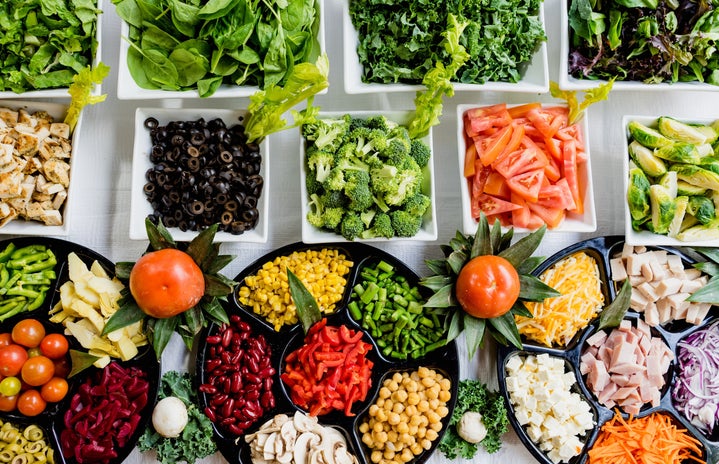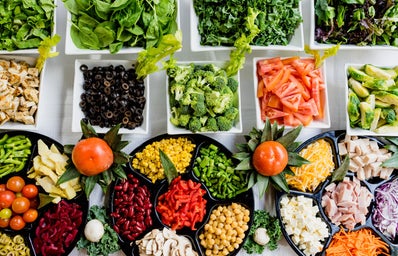Did you know that eating at least one candy bar, two or three sodas and a full serving of the fried food of your choice (can also be a candy bar) per day can actually help you lose weight?!
Yeah, right.
From celebrity-endorsed delicacies to doctor-recommended detoxes, we’re bombarded by healthy lifestyle tips that, when it comes down to it, may not be so healthy after all. It’s easy to buy into them though because they sound convincing and they promise results. But often, these promises end up being just as empty as our stomachs feel once we’ve tried them. This can be frustrating, as we try to figure out how to treat our bodies well amidst summer internships, busy class schedules, lots of extracurricular activities and of course, our social lives. To help balance it all out, Her Campus has sought out some of the most commonly-believed health myths – and uncovered the truth (if any) behind them. So whether you’re trying to lose weight, or just trying to adopt a healthier lifestyle, read on to see if your habits are based on fact or fallacy.
The Myth: Eating less (or not eating at all) will allow you to lose more weight.
The Truth: While cutting down on calories is one of the most effective ways to lose weight, anything too drastic could have a negative impact on your body. Severely cutting back on food intake – verging on anorexia – will cause you to shed pounds, but not in a healthy way. If you don’t supply your body with food to process, you’ll lose not only fat, but lean muscle too, and your metabolism will start to slow. And though you might lose weight quickly short-term as a direct result of low-intake, a slower metabolism will result in weight problems later on. If your food intake increases sometime down the road, your body won’t be able to process it quickly, and the weight will pile back on. So even though consuming fewer calories will help you lose weight right away, starving yourself or using a crash diet to do it won’t give you lasting results. According to Jackie Keller, nutrition expert and NutriFit founder, “you should consume roughly 12 to 14 times ideal body weight worth of calories each day. For example, at 5’0” the ideal weight is 100 lbs” — meaning you should be eating between 1,200 to 1,400 calories a day to maintain a healthy weight.
The Myth: Meal replacement bars/shakes/cookies/etc. are suitable meal replacements.
The Truth: SlimFast, Special K bars, Clif bars, FullBars – might keep you full with protein-packed formulas, but when it comes down to it, your body needs more than just a bar or a shake to stay satisfied. Diets like SlimFast and Special K may leave you feeling hungry. Your body doesn’t absorb vitamins and nutrients from the powders that compose bars and shakes. Keller also explains that consuming meal-replacement shakes doesn’t always make you feel like you’ve really eaten – because, simply put, you’re not chewing! You’re better off proportioning balanced meals yourself rather than relying on packaged products – these healthy habits will last much longer than any liking you might develop towards protein powders and bars. Keller suggests “hard boiled eggs, fresh fruit or vegetables, string cheese, whole wheat bagels or crackers” because they “are just as easy as a bar or shake and you feel like you’ve eaten something. You feel satisfied and full.”
The Myth: “Detox” diets are an effective way of losing weight.
The Truth: Whether you’re living on cranberry juice or water with some lemon/lime in it, none of these liquid-based “cleansing” diets will help your body rid itself of toxins or lose weight and keep it off. Keller says, “much of what we hear about ‘detox diets’ are a myth. The truth is, your body does an excellent job of detoxing all on its own when you supply it with the right nutrition and plenty of water; no starvation required!” Instead of living on a liquid diet, she says that a diet that is high in fiber from fruits, vegetables and whole grains will help your body flush out toxins. Our digestive system will work hard to rid our bodies of the toxins we encounter on a daily basis, but we shouldn’t be ingesting junk. Keller says that “broccoli, brussel sprouts, kale, cabbage and bok choy really turn on your body’s natural detox enzyme.” It’s also important to drink at least 8 glasses of water each day. That might mean a lot of bathroom breaks, but it’ll keep you healthy in the long run.
The Myth: Late-night meals pack on the pounds.
The Truth: When collegiettes come home from a night out, they rarely go straight to bed. Why would we when a Domino’s guy can be at the door in less than 10 minutes with thin-crust, cheesy bread and CinnaStix with dipping sauce? Late-nighting has notoriously been connected to the Freshman 15, and any weight gain thereafter, but sources say that eating late at night really isn’t as bad as we think it is. Oregon Health & Science University conducted a series of tests on female monkeys, and found nothing that linked late-night eating and weight gain. Dr. Judy Cameron reported to BBC NEWS that “Time and again, we’ve been told that eating late at night because it will cause weight gain. However, there isn’t a lot of research to back up this commonly held belief, which may in fact be somewhat of an urban myth.” What matters is how much we’re eating throughout the day — it’s really all about calorie intake, not the time of day we eat. So if our late-night pizza parties serve as “dinner” (or dessert? or breakfast?), then the calories aren’t extra.
[pagebreak]
The Myth: We can all have Giselle’s body as long as we do/eat everything that magazines tell us she does/eats.
The Truth: Though “we are what we eat,” unfortunately, genetics do account for much of what our bodies are like. Lucky for Giselle, she was blessed with that slender 5’11” frame, but many of us were not. That said, we can eat what she eats, and work out the way she works out, but nothing we do will make us look like her because, alas, all of our bodies are different. What we can do, however, is find what works best for us – and use her regimen as no more than a guide.
The Myth: Eggs yolks are bad for you.
The Truth: Sure, egg yolks contain around 185 milligrams of cholesterol, which puts you close to the American Heart Association’s suggested intake of 300 milligrams of cholesterol per day. But while past studies have linked cholesterol with heart disease, newer studies have found that it’s saturated and trans fats that lead to heart disease. So while you should watch your cholesterol intake, don’t avoid egg yolks altogether. Wellness dietician at St. Luke’s Boise Medical Center Stacy Beeson says eggs, including the yolk, provide you with important health benefits. “Eggs offer lean protein and vitamins A and D, and they’re inexpensive and convenient,” she says. “If you do have an egg for breakfast, just keep an eye out for the amount of cholesterol in the other foods you eat that day.”
The Myth: Energy/sport drinks are good for you.
The Truth: Keller says, “the only good thing about these drinks is that they are water-based.” They might enhance our performance on the field or at the gym by giving us a temporary energy boost, but energy drinks often contain a lot of processed sugar – which is the “junk” she referred to in regards to the toxins that our body needs to get rid of. Energy drinks will only make you thirstier; and unless you’re doing a super intense, super long workout, water is really all you need. If you’re craving something more flavorful than water, Keller suggests trying iced tea, but just be careful that the drink you choose doesn’t have too much sweetener or artificial flavoring.
The Myth: Eating several small meals throughout the day means you’re consuming fewer calories.
The Truth: This can be true, as long as you’re diligent about how much you’re actually eating. When you consume these “mini meals” be certain they aren’t as caloric as an actual meal. For an effective way to implement this idea, try three main balanced meals (breakfast, lunch, dinner) that are a little bigger, and allow yourself three small snacks throughout the day. The main meals should be smaller than what you’d order at a restaurant, but bigger than your mid-meal snack. Calories can add up quickly, even when you’re eating “healthy.” Be careful what you include in these “mini meals” and make sure that they’re actually mini. Try protein-packed snacks like trail mix or yogurt to keep you full, and not tempted to snack mindlessly.
The Myth: Gluten-free food is diet food.
The Truth: With gluten-free food popping up everywhere in supermarkets, it’s easy to assume that it’s healthier than regular old Nabisco and Hostess varieties. But in fact, sticking to a gluten-free diet is probably of no benefit to you unless you’re actually diagnosed with celiac disease or gluten intolerance. Focus on ridding your diet of excess sugars and fats as opposed to gluten, which won’t affect weight loss or gain if your body doesn’t really have a problem digesting it.
Staying healthy is hard when part of the task is staying up to date on the latest health trends. Every so often, there’s a new-fangled diet or product that promises a slimmer waistline or a more energized you, and they’re easy to buy into. But the reality is that the most basic healthy habits – eating right, exercising regularly – are the ones that will keep our bodies in the best shape. To Keller, “the bottom line is to try and keep fresh, natural foods as the basis of your diet. Foods grown from the ground and not from a factory or man-made products are always going to be healthy.”
So while we love to indulge in that sugary cocktail or chocolate-y candy bar once in a while, it’s essential to keep everything in check. Balance is the key, and getting to know your own body is important as you learn how to take care of it. So the next time a friend tells you that the cranberry juice cocktails they’re serving at the bar offer you a full serving of fruit in liquid (or alcoholic) form, check her facts – or you’ll be dealing with a little more than just a next-day headache.
Sources:
http://listverse.com/2009/03/18/top-10-food-myths-debunked/
http://www.eatingwell.com/blogs/food_news/_new-study-says-organic-food-not-healthier-really-true
http://fitbie.msn.com/slideshow/6-mostly-false-food-myths-revealed/slide/2
http://www.thinforlife.info/metabolism.html
http://www.everydiet.org/diet/lemonade-diet
http://bodybuilding.about.com/od/womensfitnesstopics/a/womenmyths.htm
http://www.hsph.harvard.edu/nutritionsource/what-should-you-eat/carbohydrates/
http://news.bbc.co.uk/2/hi/health/3263249.stm
http://www.forbes.com/2009/07/22/common-health-myths-lifestyle-health-myths_slide_10.html
http://www.mayoclinic.com/health/birth-control-pill/wo00098/nsectiongroup=2
http://www.loseweightdietrecipes.com/images/low-calorie-slimfast.jpg
http://www.bodybuilding4fitness.com/images/female-bodybuilding-image.jpg
http://www.outsmarthormones.com/wp-content/uploads/2011/03/healthy-living-web.gif
http://www.mayoclinic.com/health/birth-control-pill/wo00098/nsectiongroup=2

